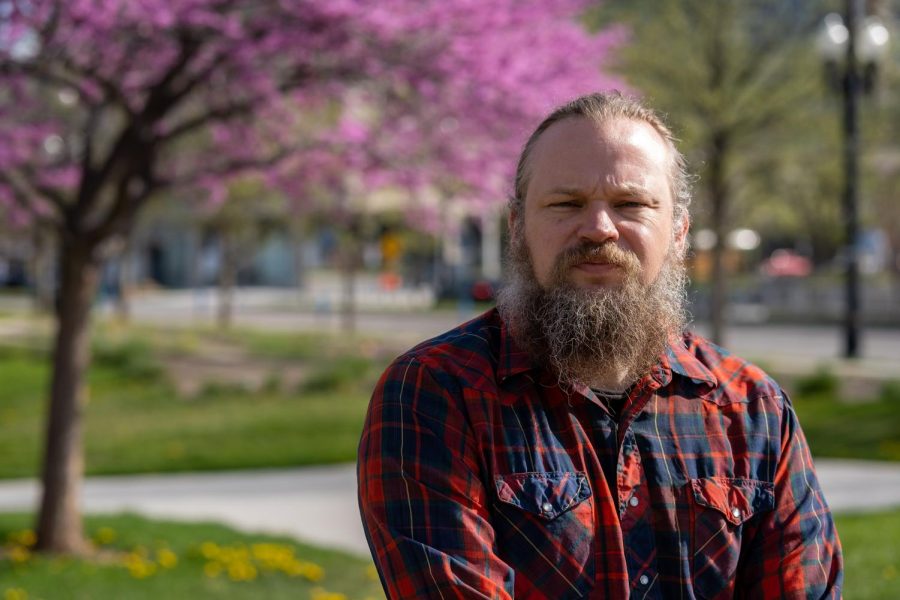Eric Peterson: Helping the Public Through Investigative Journalism
Eric Peterson posing outside the Salt Lake City Public Library in Salt Lake City on Tuesday, May 2, 2023. (Photo by Marco Lozzi | The Daily Utah Chronicle)
May 7, 2023
Eric Peterson, a communications professor at the University of Utah started out his college career jumping between different majors, unable to figure out what he wanted to focus on professionally. Now he is working to contribute to the community through the power of investigative journalism.
Peterson first started his career in journalism while in college, when he realized he was passionate about reporting and writing stories at his first internship.
“I did an internship with the Salt Lake City Weekly, and really fell in love with it,” Peterson said. “I realized I can exercise my curiosity and learn about a topic, write about it, talk to interesting people, help solve problems and make powerful people uncomfortable.”
For Peterson, journalism allows an avenue for him to express himself while uncovering and revealing the dishonesty of those in power to the public. His specialty is investigative journalism, a form of journalism that involves “systematic, in-depth and original research and reporting, often involving the unearthing of secrets,” focusing on enforcing social justice and accountability, according to the Global Investigative Journalism Network.
“Especially with investigative journalism, I really like having an impact,” Peterson said. “I get curious about things and I want to find out things that people should know, uncover corruption. I want to expose wrongdoing. I want to help people figure out what’s going on and help communities.”
Dan Harrie, a former editor at The Salt Lake Tribune and friend of Peterson’s, recalled a story where Peterson exposed a doctor for malpractice but the state allowed him to continue taking patients. Harrie, who had been a patient of that doctor previously, was impressed with Peterson’s work and his refusal to cater to those in power.
“He does not give up when he gets his teeth into a story,” Harrie said. “He will just keep digging. And no matter how long it takes, no matter the obstacles that are thrown up in his way, he’ll somehow, someday get that story.”
After several years of working as a journalist for the City Weekly and dabbling in other professions, Peterson turned his focus to instructing others about journalistic tactics with his non-profit organization The Utah Investigative Journalism Project, and as a part-time teacher at the U.
“With my nonprofit, I like investigative stories, but I also like an educational component to it,” he said. “I wanted to start doing training and help local newsrooms. So with that, it makes sense to do some teaching as well.”
Peterson’s non-profit offers free training to local news outlets and communities interested in journalism, working with journalists in Salt Lake City instead of against them.
“I don’t think more competition [in the journalism industry] is beneficial,” Peterson said.
He added that news outlets “have to figure out ways to kind of work together and make sure that our unique and distinct voices survive and that we’re all contributing to the information that everybody needs.”
The aim of this project was also to keep investigative journalism alive in Salt Lake City during a time when “a lot of organizations all over the country and the world have cut back on [it]” due to the risk, lack of budget and legal threats associated with this type of journalism, according to Peterson.
“The broader community needs somebody that’s paying attention and that is asking these questions,” he said. “When there are people who are actively questioning the state of things, that ultimately leads to one question, which is, ‘Why are things this way, and could they be better?’”
Investigative journalism keeps those in power accountable for their actions, Peterson said, and he plans to continue growing his nonprofit to be able to uncover more stories that are vital for the public to know.
“It’s really about finding out the stories that aren’t getting told, whether they’re overlooked or they are powerful people that want to keep their secrets to themselves,” Peterson said. “When you’re in the public sphere and you are a public official, the public has a right to know.”









